The Top 5 Ways the Atlanta Braves Contend in 2017

The best thing about the beginning of baseball season is every team has some level of hope for having a good year. Some teams, like the Cubs or Red Sox, have an abundance of hope. Others, like the Padres or Reds, have much less. For the Atlanta Braves, their level of hope can best be described as ‘more than they’ve had recently, but less than they want’.
The Atlanta Braves spent the off-season upgrading their starting rotation and combined with a lineup that held it’s own the second half of last year, the Braves have definitely increased their chances.
With that, I wanted to look at whether it’s possible for Atlanta to contend in 2017. And if so, what exactly has to happen for them to be playing meaningful games in the fall.
To keep it objective, I’ll also be posting a similar piece on what would have to happen for Atlanta to get the number 1 pick.
Ground Rules
To play this game, we have to set some guidelines.
First, I’m going define contention as a .500 record or better. This is admittedly an arbitrary line but my logic is anything over 81 wins means you’re typically within 3 or 4 games for the postseason. And that seems like a reasonable definition of contention.
Second, we have to set a baseline for this year. Looking at all the available projections for the upcoming season I’m setting Atlanta’s baseline win expectation at 74-88. This, again, is arbitrary but looking at all the data, it’s is a perfectly reasonable summation of the projection systems.
So now that we have our goal and our baseline we need to set some rules:
- This is the land of the realistic so this will be a list of things that have a reasonable chance of coming true. Yes, if Matt Kemp played like Mike Trout it would greatly help Atlanta’s playoff chances but here on planet earth, that’s not happening.
- I’m using WAR where applicable. WAR takes true talent and converts it to wins and since we’re trying to get from 74 wins to 81 wins, it works well.
- To be clear, this is not a list of 5 things that ALL to need to happen for Atlanta to contend. Any one of these alone could be enough.
- As always with pieces like this, these our my opinions. You will think something different. That’s okay. Just be respectful.
Ok let’s go!
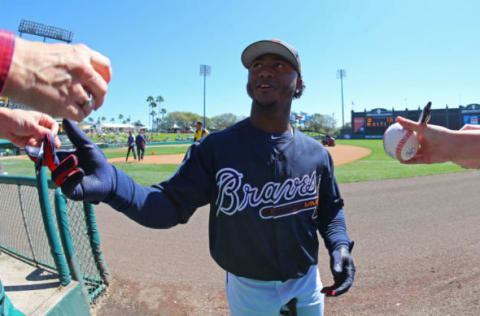
5. Unexpected Contributions From Prospects
For a team that’s in the middle of rebuilding, the Braves 2017 team is heavily relying on veterans.
Five of Atlanta’s eight everyday position players are over 30 as well as 3 of the 5 in the starting rotation. It’s been labeled a bridge year. What this means is there really isn’t a high expectation for any of Atlanta’s top prospects to contribute this year.
This reality opens up the door for some unexpected performances. For instance, Brandon Phillips is projected to be around a 1 WAR player.
What if Phillips gets hurt or traded and Ozzie Albies comes up and preforms more like a 2 or 3 WAR player? That changes the overall outlook. The same game can be played with Adonis Garcia and Rio Ruiz or R. A. Dickey and Sean Newcomb. The 1 win veteran gets hurt or moved and the prospect comes in preforms at a higher level.
And you could apply this idea with a few pitchers that could make their debut in 2017. Both the rotation and bullpen could be better by simply removing a less talented veteran and replacing him with a high ceiling prospect.
It’s certainly shouldn’t be expected but it’s not some outlandish notion that Atlanta has some top prospects ready to preform this year at a level higher than their veteran counterparts. And it only takes a few of these instances to occur to bump the win total to a competitive level.
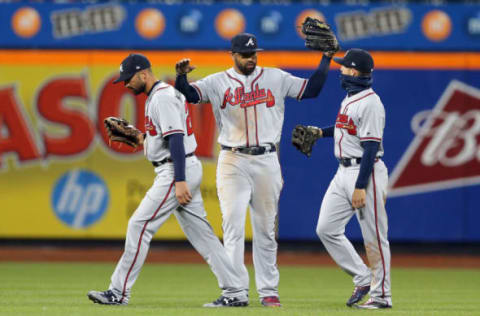
4. The Veterans are Collectively Better
The flip side of number 5 is that the older players the Braves brought in to bridge the gap to the future simply preform better than expected collectively. Matt Kemp, Nick Markakis, Adonis Garcia, Brandon Phillips, and Tyler Flowers are expected to be worth about 5 wins combined.
If instead those 5 guys are worth something closer to 8 or 9 wins combined, it changes the equation. And that reality does’t require any of one of those guys to play out of their minds in 2017. If each guy simply improves upon is projection by 0.5 wins, it can happen.
Same goes with the pitchers. Bartolo Colon, Jaime Garcia, and R. A. Dickey are projected to be worth about 5 wins. Would it really be a shock to the world if those 3 guys end up closer to 7 wins? All 3 have a track record of getting major league hitters out and if they can stay healthy, it’s definitely plausible.
Players out preforming their projections by 0.5 wins doesn’t require some great leap in performance and it’s possible Atlanta could have some hidden wins in their more seasoned players.
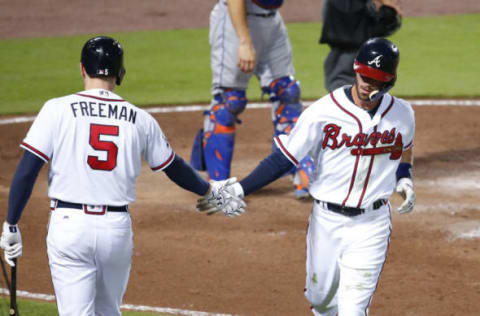
3. Atlanta’s Core Takes Their Big Step
When I look a this team, I look at it in 3 parts. There are the veterans bridging the gap and playing out their careers, the journeymen taking advantage of playing time situations, and the core.
You can figure out which guys belong to the first two groups but the essential guys make up the core.
I define the core as:
These are the guys I think we’ll be a part of the next great Atlanta Braves team. Or at least most of them. And these guys taking big steps forward can drastically change both the present and the future..
Julio adding more strikeouts and becoming a 5 win pitcher instead of a 3 win pitcher. Dansby adding more power and possibly becoming a 4 win SS. Folty turning into that ace he shows flashes of being. Freddie and Ender can’t reasonably be expected to improve on what they’ve done but they certainly could maintain their level.
At some point in this rebuild, Atlanta is going to need stars. Freeman is one and anyone of those core guys could eventually join him as a 5 or 6 WAR player. And if that happens in 2017, the win total is going up and contention absolutely becomes realistic goal.
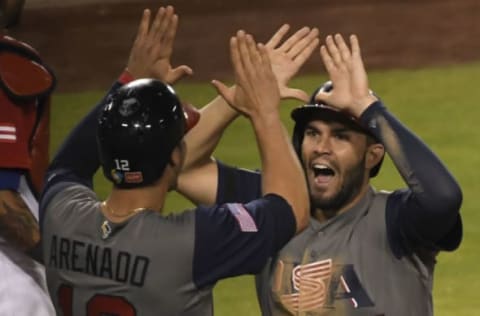
2. Trade For a Star(s)
The first three ways to contention on this list involve pieces already in the organization tapping into more talent to raise the projections from within. That’s the problem after all, the Braves simply don’t have the talent yet.
Well the easiest way to fix a lack of talent is to simply acquire more talent. It’s also a really quick way to raise your win expectation.
This is going to happen at some point. If Atlanta tries to field a championship level team using only players they’ve drafted and developed, it’s going to be 2020 before it happens.
Now that 2020 team would be stacked but I don’t get the sense Coppy and Hart are looking for another 3 years of rebuilding.
More from Tomahawk Take
- Braves News: Braves re-sign Stephens, Will Atlanta extend Max Fried?, more
- Notable Atlanta Braves Reunions Since 2003: Pitcher Edition
- Braves News: Braves re-sign Jackson Stephens
- Braves News: Braves prospect rankings, Correa deal with Mets at risk, more
- Why the Atlanta Braves won’t extend Max Fried
And if it’s going to happen eventually, it could happen this year. If Atlanta finds itself around .500 in July, I really wouldn’t shocked if Coppy pulls the trigger on a big deal. And like I mentioned earlier, the 2017 Braves have plenty of positions that can be upgraded.
What if the Rockies fall out of it and decide to sell high on Nolan Arenado? Or the same story with Arizona and A. J. Pollock or Jake Lamb? What if Tampa finally moves Chris Archer or Evan Longoria?
Note that this will not be as far-fetched as you might think: both current trade market conditions and the new free agent compensation rules heavily favor the tactic of trading your stars away before you lose them to The Big Contract. Teams will entertain offers.
I can’t say I fully endorse it but I promise you, if the Braves hold their own the first part of the year, the front office will be looking for splash move come July.
And if they land that piece, it absolutely could be enough to keep this team contending into September and maybe October.
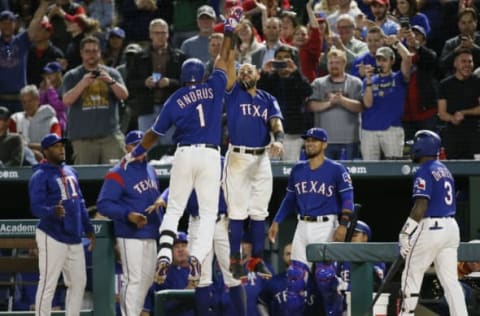
1. Sequencing
Some of you have no idea what this means. Or maybe you do know what it means but have no idea how it relates to baseball. But believe or not this is the best chance Atlanta has to contend in 2017.
Sequencing, most simply, is the order in which events occur and this small idea can change results in big ways.
Two teams can produce the same number and same type of offensive events but depending on how they’re sequenced, can produce two very different outcomes. Two singles followed by home run leads to quite a different result than a home run followed by two singles.
The Braves will hit fewer singles, doubles, triples, and home runs than the best offensive teams in baseball. That’s the talent problem. They won’t produce the same number of positive events as the elite teams. And that’s how projection systems work. They measure teams by their inputs. How many positive events they produce. Logically, the best teams produce the most and the worst produce the least.
But here’s the problem. Those projection systems assume a normal level of distribution of those events over a season. And that’s what happens for most teams. But every year there are 2 or 3 teams that outperform their projections by grouping their positive events together to produce more runs and therefor more wins then talent level says they should.
A Little History
Last year it was the Rangers. The Rangers were 15th in baseball in wRC+ but 7th in baseball in runs scored. They were 23rd in baseball in runs allowed but 3rd in baseball in wins. The Rangers allowed 20 more runs to score than the Milwaukee Brewers. The Brewers won 73 games. The Rangers won 95 games. How?
The Rangers won the sequencing lottery last year.
The year before that it was the Orioles. The year before that the Royals.
Two days ago I watched Madison Bumgarner throw 5 perfect innings against the Diamondbacks. Meanwhile the Giants offense put together threat after threat but only produced 3 runs. In the 6th inning, Arizona produced it’s first positive offensive result, a triple by Jeff Mathis. Then a single. Then a home run. And just like, tie game. The Giants vastly outplayed the Diamondbacks the first 6 innings but because Arizona optimized it’s only 3 positive events, the game was tied.
This is sequencing. And it’s how average teams win more games than they should.
The good news for Atlanta is they’re an average teams and this could dramatically change their season. The bad news for Atlanta is sequencing is mostly random. Teams can’t control it. If teams could control how they sequence their play, we’d see a lot more three-run home runs and a lot fewer solo home runs.
An easy test to see if what you’re watching is true talent level or sequencing is looking at team batting average vs team batting average with runners in scoring position (RISP). Because we know these two stats are not separate skills, a large discrepancy between the two can be a good indicator sequencing is affecting outcomes.
It’s Happened Before
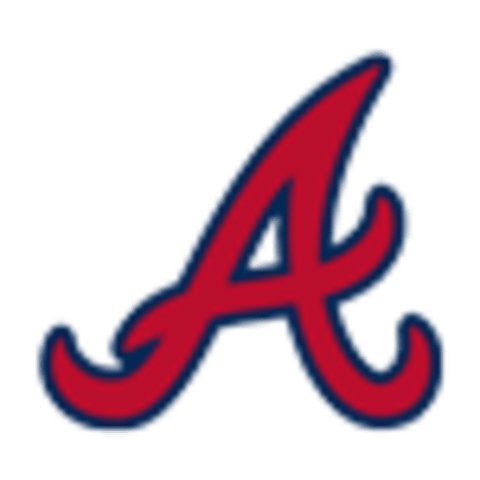
Atlanta Braves
You guys remember the 1st half of 2015 when Atlanta surprised everyone and went 42-42 in their first 84 games? Sequencing. They hit .256 as team in that 1st half but with RISP, they hit .284.
Overall they we’re hitting at a normal level but those hits were being grouped together optimally. This led to more runs which led to more wins and a drastic change in actual win totals vs expected win totals. Their luck ran out.
Sometimes the luck runs out like it did in the second half of 2015. Sometimes it doesn’t like the Rangers in 2016. But this simple idea changes the fate of at least a couple of teams every year both positively and negatively. Luck goes both ways after all.
I chose this as number 1 because it doesn’t require changes. No trades or new additions. It doesn’t require any improvement by current players or surprise performances by veterans or prospects. They just need luck.
Maybe 2017 is the year Atlanta wins the sequencing lottery. Maybe not. But it’s probably more likely than hoping an average team suddenly starts playing like a good or great one.
Next: Kemp Chops Don't Add Up to Enough
Okay… there you have it. Feel free to let me know how stupid I am in the comments or on Twitter.